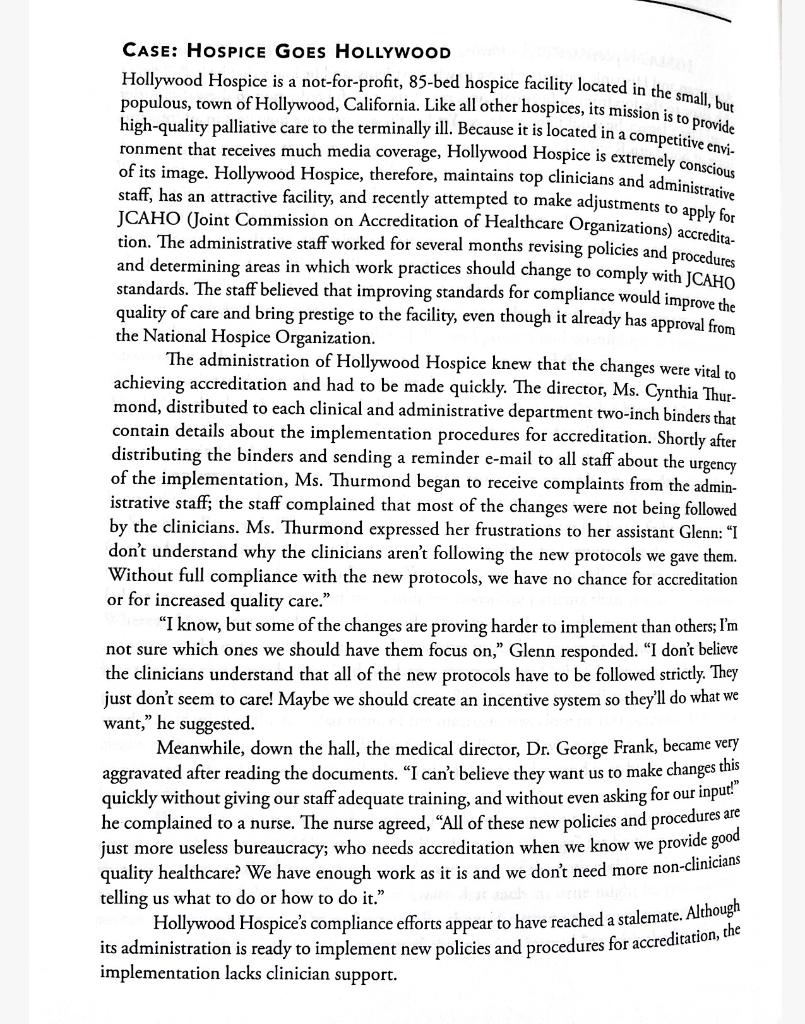Answered step by step
Verified Expert Solution
Question
1 Approved Answer
Case study question: 1. Hospice Goes to Hollywood Case: Using the information from this chapter and the case study, explain how Ms. Thurmond should lead

Case study question:
1. Hospice Goes to Hollywood Case: Using the information from this chapter and the case study, explain how Ms. Thurmond should lead Dr. Frank to help achieve Joint Commission accreditation. Which leadership theories or models should she use?
Case: Hospice Goes HollywoOd Hollywood Hospice is a not-for-profit, 85-bed hospice facility located in the small, but populous, town of Hollywood, California. Like all other hospices, its mission is to provide high-quality palliative care to the terminally ill. Because it is located in a competitive environment that receives much media coverage, Hollywood Hospice is extremely conscious of its image. Hollywood Hospice, therefore, maintains top clinicians and administrative staff, has an attractive facility, and recently attempted to make adjustments to apply for JCAHO (Joint Commission on Accreditation of Healthcare Organizations) accreditation. The administrative staff worked for several months revising policies and procedures and determining areas in which work practices should change to comply with JCAHO standards. The staff believed that improving standards for compliance would improve the quality of care and bring prestige to the facility, even though it already has approval from the National Hospice Organization. The administration of Hollywood Hospice knew that the changes were vital to achieving accreditation and had to be made quickly. The director, Ms. Cynthia Thurmond, distributed to each clinical and administrative department two-inch binders that contain details about the implementation procedures for accreditation. Shortly after distributing the binders and sending a reminder e-mail to all staff about the urgency of the implementation, Ms. Thurmond began to receive complaints from the administrative staff; the staff complained that most of the changes were not being followed by the clinicians. Ms. Thurmond expressed her frustrations to her assistant Glenn: "I don't understand why the clinicians aren't following the new protocols we gave them. Without full compliance with the new protocols, we have no chance for accreditation or for increased quality care." "I know, but some of the changes are proving harder to implement than others; I'm not sure which ones we should have them focus on," Glenn responded. "I don't believe the clinicians understand that all of the new protocols have to be followed strictly. They just don't seem to care! Maybe we should create an incentive system so they'll do what we want," he suggested. Meanwhile, down the hall, the medical director, Dr. George Frank, became very aggravated after reading the documents. "I can't believe they want us to make changes this quickly without giving our staff adequate training, and without even asking for our input!" he complained to a nurse. The nurse agreed, "All of these new policies and procedures are just more useless bureaucracy; who needs accreditation when we know we provide good quality healthcare? We have enough work as it is and we don't need more non-clinicians telling us what to do or how to do it." Hollywood Hospice's compliance efforts appear to have reached a stalemate. Although its administration is ready to implement new policies and procedures for accreditation, the implementation lacks clinician supportStep by Step Solution
There are 3 Steps involved in it
Step: 1

Get Instant Access to Expert-Tailored Solutions
See step-by-step solutions with expert insights and AI powered tools for academic success
Step: 2

Step: 3

Ace Your Homework with AI
Get the answers you need in no time with our AI-driven, step-by-step assistance
Get Started


